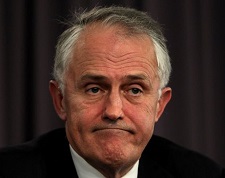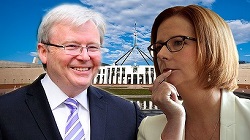Troy Bramston’s book Rudd, Gillard and Beyond has on its front cover “Why Labor lost and what it must do to win again and stay in power”. It is short, strikes a reasonable balance on the whole and contains a good deal of new material. It focusses primarily on the narrative arc of the Labor Party in and out of power since the Whitlam years. The clash of personalities and the political scheming are seen in that context.
In this piece I write about the book and it’s subject, rather than attempt a review as such.
Bramston draws on Whitlam’s foreword to The Whitlam Legacy (edited by Bramston) which forms a ‘valedictory’ message to the party he led in opposition and in government for a record 11 years. He draws on interviews with Hawke, Keating and Rudd for the book, also Beazley and Simon Crean as former leaders. Gillard declined to be interviewed.
On the 2010 leadership change, Bramston subscribes to the view that Rudd’s administration at this time was increasingly centralised, chaotic and paralysed in terms of decision-making. His communication with the people through the media became confused.
That is the view I got from Bramston. Not as vivid as the language apparently used in Philip Chubb’s book, according to Stephen Mills’ review of Bramston, but contra Mills, in substantial agreement with Chubb.
Crean view is that cabinet worked well under Hawke and Keating but never worked as a vibrant decision-making forum under either Rudd or Gillard. Under Rudd cabinet was effectively replaced by the ‘gang of four’ (Rudd, Gillard, Swan and Tanner). Towards the end it too was supplanted. Gillard complained in the email, reproduced in full, that she sent Rudd two days before the challenge, that work to be done in broader consultation had been folded into the Prime Minister’s Office and decisions communicated to the back bench of which she knew nothing.
Gillard was increasingly concerned and tried hard to rectify matters. Along the way she did sound out certain people about putting herself forward, but her claim that she made the final decision on the day is probably true. Certainly she knew about the plotting and did not discourage it, but resolutely refused to make herself available. This is a reasonable summary of Gillard’s position:
‘Gillard was the last person onboard,’ says one MP… ‘There was no strategy, no planning, no move on Rudd in advance. Gillard did everything she could under the worst possible circumstances to help. He just wouldn’t listen.’
According to Mills’ review Rudd couldn’t listen, he was in such a state.
Certainly Gillard’s staff prepared a speech for her in the event she became PM, Bramston says at least two weeks before the event.
Gillard denies that she gave any instruction in this regard. In my view, even if she did, Gillard did nothing unethical. Nevertheless the manner of coming to the prime ministership was highly problematical in public perception and hence in political impact.
Bramston’s scoop is an email Gillard sent Rudd and Alistair Jordan two days before the famous meeting. This graphically shows how even Gillard was left in the dark, with back-benchers being briefed on matters of which she had no knowledge.
It is arguable that Gillard put herself forward in the best interests of the party, just as it is arguable that Rudd’s desire to regain the office took no shape until Gillard was in a hopeless position politically.
Bramston records Rudd’s account of what went on in the famous meeting in June 2010. Rudd said that Gillard agreed he would continue in the job until an election was due to be called. If the government was then not in a winning position he would hand over. Then Gillard’s adviser, Amanda Lampe, entered the room without authorisation to say that Gillard was needed on the phone. Gillard took the call in his outer office, came back and said that she had decided to challenge. Rudd took this as reneging on an agreement, rather than changing her mind in the face of new information. Rudd thereupon terminated the meeting.
Bramston says that the person on the other end of the phone was Stephen Conroy, who told her that it was all over the news and there was no way she could exit the meeting and say everything was OK. Quite clearly Rudd would be given no space to rebuild his position.
Rudd came to regard Gillard’s action as an ‘original sin’ and sought to right the wrong. Bramston simply asserts that Rudd began his attempt to regain the leadership immediately, although I’ve seen no evidence that he became active in that regard before around December 2012, when Gillard airbrushed him from Labor history in a speech to the national ALP convention. Certainly Bramston cites no evidence.
On the leaks during the 2010 campaign Bramston says:
It is widely understood within Labor that these leaks came directly from Rudd or his supporters.
This is lazy journalism and neglects the possibility that the leaks could have come from Abbott supporters within the public service.
Bramston rather neglects the role of the media in the political process. He does mention the egregious attitude the media took to Gillard, but it comes late and is underdone.
Bramston cites opinion poll research at various points. In June 2010 he notes a UMR report that Gillard had a positive rating of 22% in doing her job. Rudd was on net -17%. The report compiled ‘word clouds’ about the politicians. Rudd was seen as arrogant, untrustworthy, disappointing, hopeless, dud, liar, incompetent and trier. Gillard was seen as strong, positive, intelligent, competent, good, smart and confident. This research was shown around caucus, some say by Gillard herself.
There awere no word clouds in 2013, but the ratings were very much reversed.
In the 2013 election Rudd’s best chance would have been to project calmness and rely on the fact that he was neither Abbott nor Gillard. Bramston’s summary account is that Rudd blew a winning position by over-agitation, hair-brained ideas, and trying to do everyone’s job accept his own. Certainly the election campaign office was staffed by Gillard loyalists, who had worked up a campaign for Gillard.
There is a serious question whether Rudd in fact saved the furniture. Bramston describes detailed ground work done in marginal NSW seats by the party and by the unions throughout Australia.
By the end of the campaign, 396,408 phone calls had been made by over 500 volunteers to undecided voters. US research shows this is the most effective way to target undecided voters, other than doorknocking.
The unions worked on similar strategies across the country including targeting their own membership.
Bramston has a succinct summary of what each Labor prime minister achieved in office and notes their failures. Whitalm perhaps comes out best. Bramston feels that history may become kinder to both Gillard and Rudd. Amazingly he thinks Gillard did her best work in foreign affairs. For example, securing an annual leaders forum with India and China had eluded her predecessors.
One of her biggest failures was to do exactly nothing about party reform, when her party needed it most. Part of Rudd’s legacy is that he started the party reform ball rolling.
Keating is perhaps most eloquent about what Labor is about:
‘I believe the public has accepted the Labor model: an open, competitive, flexible economy grafted to a social wage guaranteeing access and equity in health, education, in superannuation and in social policy generally.’
He says Labor is losing the debate about how you facilitate the organic development of that construct.
Shorten’s shorter creed:
‘Labor believes in building a good society. A good society is founded on jobs, education, healthcare, good retirement incomes, a fair go at work.’
Shorten admires Hawke’s ‘consensus’ political model, Keating’s ‘bravery’ and Whitlam’s ‘reform vision’. Bramston thinks he’ll need all three.
Finally Bramston gives his own ideas on party reform under the headings of
- leadership reform
- candidate selection
- unions
- conferences, and
- members.
Problem is all changes need to be approved by the ALP convention which is not due until 2015.
Overall Bramston’s book is good value. I’d also unreservedly recommend Mungo MacCallum’s The Mad Marathon: the Story of the 2013 Election for what it covers. Jacqueline Kent’s Take Your best Shot is useful on Gillard’s prime ministership. Kerry-Anne Walsh’s The Stalking of Julia Gillard is brilliant on the role of the media, but marred in my opinion by a visceral hatred of Rudd which affects her objectivity.
 I’m told Germans have little respect for politicians, rating them at the bottom of the pile. Generally, though, they are said to be courteous, even boring in how they conduct their politics, although it doesn’t altogether look that way from the outside.
I’m told Germans have little respect for politicians, rating them at the bottom of the pile. Generally, though, they are said to be courteous, even boring in how they conduct their politics, although it doesn’t altogether look that way from the outside.
 When Malcolm Turnbull was Minister for Communication he was often refreshingly honest about LNP policies he didn’t agree with, leading to an expectation that when he became PM policies would be modified. Now that politics is alive again after the summer torpor, several well-known commentators have taken a look at what the change to Turnbull means.
When Malcolm Turnbull was Minister for Communication he was often refreshingly honest about LNP policies he didn’t agree with, leading to an expectation that when he became PM policies would be modified. Now that politics is alive again after the summer torpor, several well-known commentators have taken a look at what the change to Turnbull means. 